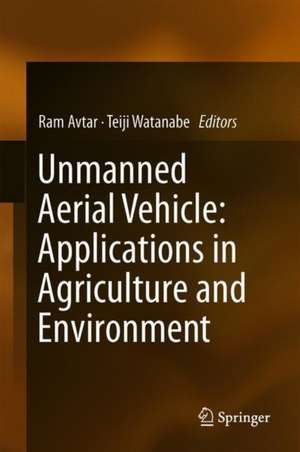Unmanned Aerial Vehicle: Applications in Agriculture and Environment
Editat de Ram Avtar, Teiji Watanabeen Limba Engleză Hardback – 27 noi 2019
The book will be of great interest to researchers engaged in forest carbon measurement, road patrolling, plantation monitoring, crop yield estimation, crop damage assessment, terrain modelling, fertilizer control, and pest control.
| Toate formatele și edițiile | Preț | Express |
|---|---|---|
| Paperback (1) | 545.64 lei 38-44 zile | |
| Springer International Publishing – 27 noi 2020 | 545.64 lei 38-44 zile | |
| Hardback (1) | 726.31 lei 38-44 zile | |
| Springer International Publishing – 27 noi 2019 | 726.31 lei 38-44 zile |
Preț: 726.31 lei
Preț vechi: 943.26 lei
-23% Nou
Puncte Express: 1089
Preț estimativ în valută:
139.02€ • 151.06$ • 116.86£
139.02€ • 151.06$ • 116.86£
Carte tipărită la comandă
Livrare economică 17-23 aprilie
Preluare comenzi: 021 569.72.76
Specificații
ISBN-13: 9783030271565
ISBN-10: 3030271560
Pagini: 199
Ilustrații: VIII, 199 p. 110 illus.
Dimensiuni: 155 x 235 mm
Ediția:1st ed. 2020
Editura: Springer International Publishing
Colecția Springer
Locul publicării:Cham, Switzerland
ISBN-10: 3030271560
Pagini: 199
Ilustrații: VIII, 199 p. 110 illus.
Dimensiuni: 155 x 235 mm
Ediția:1st ed. 2020
Editura: Springer International Publishing
Colecția Springer
Locul publicării:Cham, Switzerland
Cuprins
Chapter 1.Introduction.- Chapter 2. Precision agriculture and Unmanned Aerial Vehicles (UAVs).- Chapter 3.Unmanned Aerial Vehicle (UAV)-based Hyperspectral imaging system for precision agriculture and forest management.- Chapter 4. Unmanned Aerial Vehicle (UAV) for fertilizer management in grassland of Hokkaido, Japan.- Chapter 5. Corn height estimation using UAV for yield prediction and crop monitoring.- Chapter 6. Supporting Oil palm replanting programs using UAV and GIS in Malaysia.- Chapter 7. Applications of UAVs in Plantation Health and Area Management in Malaysia.- Chapter 8. Unmanned Aerial Vehicle System (UAVS) Applications in Forestry and Plantation Operations: Experiences in Sabah and Sarawak, Malaysian Borneo.- Chapter 9. UAV-based SfM-MVS mapping cliff face in central crater of Miharayama, Izu Oshima, central Japan.- Chapter 10. Applications of UAV remote sensing to topographic and vegetation surveys.- Chapter 11. The Role of Infrared Thermal Imaging in Road Patrolling Using Unmanned Aerial Vehicles.- Chapter 12. Fusion and Enhancement Techniques for Processing of Multispectral Images.- Chapter 13. Application of Unmanned Aerial Vehicle (UAV) for Urban Green Space Mapping in Urbanizing Indian Cities.- Chapter 14. Responsibility and accountability in the governance of civilian UAV for crop insurance applications in India.
Notă biografică
Dr. Ram has expertise in the field of Geographic Information System (GIS) and Remote Sensing (RS) which has been developed over the last eight years. Dr. Ram completed his PhD from the Department of Civil Engineering, University of Tokyo, Japan in 2012. He is currently working as an Assistant Professor in the Graduate School of Environmental Earth Science, Hokkaido University, Japan and is teaching both masters and PhD students. Before joining Hokkaido University, he was associated with United Nation University Institute for the Advanced Study of Sustainability (UNU-IAS), Tokyo, Japan as a Research Fellow. Dr. Ram has published several research papers in RS and GIS related research in peer-reviewed international journals. His research interest is in applications of Geospatial techniques to monitor terrestrial ecosystem including forest, agriculture, urban and disasters and disseminating the results to policy-makers. Currently, he is working on the synergistic use of remote sensing and Unmanned Aerial Vehicles (UAVs) techniques to monitor environment more precisely to solve environmental issues from global to local scale.
Textul de pe ultima copertă
This book showcases how new and emerging technologies like Unmanned Aerial Vehicles (UAVs) are trying to provide solutions to unresolved socio-economic and environmental problems. Unmanned vehicles can be classified into five different types according to their operation. These five types are unmanned ground vehicles, unmanned aerial vehicles, unmanned surface vehicles (operating on the surface of the water), unmanned underwater vehicles, and unmanned spacecraft. Unmanned vehicles can be guided remotely or function as autonomous vehicles. The technology has a wide range of uses including agriculture, industry, transport, communication, surveillance and environment applications. UAVs are widely used in precision agriculture; from monitoring the crops to crop damage assessment. This book explains the different methods in which they are used, providing step-by-step image processing and sample data. It also discusses how smart UAVs will provide unique opportunities for manufacturers to utilise new technological trends to overcome the current challenges of UAV applications.
The book will be of great interest to researchers engaged in forest carbon measurement, road patrolling, plantation monitoring, crop yield estimation, crop damage assessment, terrain modelling, fertilizer control, and pest control.
Caracteristici
Explains the different methods applied to the UAV deployment in agriculture Provides a step-by-step processing of image representation Sample data is included for learning purposes
